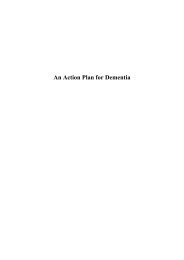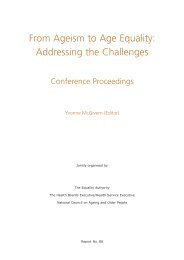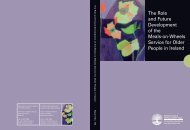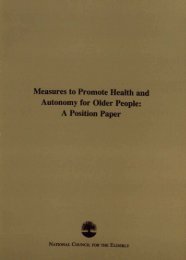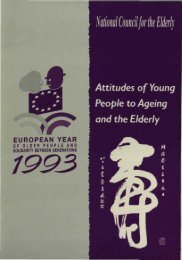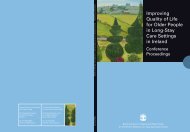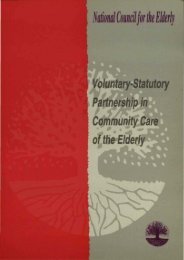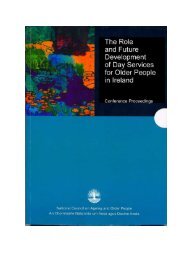Assessment of Older People's Health and Social Care Needs and ...
Assessment of Older People's Health and Social Care Needs and ...
Assessment of Older People's Health and Social Care Needs and ...
- No tags were found...
You also want an ePaper? Increase the reach of your titles
YUMPU automatically turns print PDFs into web optimized ePapers that Google loves.
Age <strong>Care</strong> Evaluation TeamThe next level <strong>of</strong> assessment is conducted by the age care evaluation team. Essentially, this teamcollates the assessments <strong>of</strong> the multi-disciplinary team. We also do further assessment with carers,so there is assessment <strong>of</strong> carer management, difficulties <strong>and</strong> satisfaction. The team will recommendcare options that aim to meet the needs <strong>and</strong> preferences <strong>of</strong> the older persons <strong>and</strong> their carers. Apackage <strong>of</strong> care is developed <strong>and</strong> we then liaise with the GP, the PHN, statutory bodies such as thelocal authority, <strong>and</strong> voluntary bodies, for example, the Alzheimers Association (always with theconsent <strong>of</strong> the older person) so as to ease the transition <strong>of</strong> the older person either to home or tolong-stay care.Reflections on the <strong>Assessment</strong> ModelStrengths <strong>of</strong> the ModelThe strengths <strong>of</strong> our model <strong>of</strong> assessment are:• the excellence <strong>of</strong> the inter-pr<strong>of</strong>essional working• the fact that key staff have embraced the vision <strong>of</strong> comprehensive, integrated care for olderpeople• the contribution <strong>of</strong> the Elder <strong>Care</strong> Group, comprising heads <strong>of</strong> disciplines, which was set up tosupport the implementation <strong>of</strong> the 'Ageing with Confidence' strategy in Kerry it identifies servicedeficits <strong>and</strong> problems; <strong>and</strong> aims to find solutions to those problems• local multi-disciplinary teams which identify problems at their own level <strong>and</strong> feed information tothe Elder <strong>Care</strong> Group.IssuesIssues have arisen in our work as well. The key staff have embraced -the vision which supports ourapproach to assessment, but there are others who are reluctant collaborators. There can bedifficulties with the sharing <strong>of</strong> information, for example in relation to discharge notifications. We arepiloting a new discharge system to address that issue as I speak.Though we have a framework for a service, we have just one geriatrician <strong>and</strong> one specialist age careevaluation team, so we do need additional resources.There is a lack <strong>of</strong> appropriate resources, suchas sheltered housing, in local areas. Another issue is the predominance <strong>of</strong> the biomedical model.<strong>Older</strong> people's needs are very complex <strong>and</strong> a combined bio-social-psychological model would be moreappropriate to meet those needs.Our social structure is changing.An increasing number <strong>of</strong> older people are living alone <strong>and</strong> morewomen are working outside the home. There is increasing cultural diversity in our society <strong>and</strong> we haveto be able to respond to the needs <strong>of</strong> ethnic groups who have different approaches to ageing <strong>and</strong> death.We also have to take on the challenge <strong>of</strong> inter-agency working. <strong>Older</strong> people's needs encompasssocial needs such as housing <strong>and</strong> transport. As a health board, we have to recognise those needs <strong>and</strong>act as a catalyst to bring the services together to meet older people's needs.---Conference Proceedings





